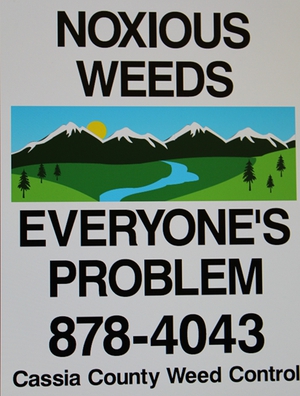Noxious Weed
Michael Ottley
Noxious Weed Control & Invasive Species Superintendent
Email: mottley@cassia.gov
Tyson Young
Weed Lead Technician
Email: tyoung@cassia.gov
Ronna Southern
Weed Technician
Email: rsouthern@cassia.gov
Sarah Somsen
Noxious Weed Administrative Assistant
Email: ssomsen@uidaho.edu
1459 Overland Ave. Rm #4
Burley ID 83318
Phone: (208) 878-4043
Fax: (208) 878-7862
The following are effective April 7, 2025:
Area of Noxious Weed Extermination.pdf
Notice to Comply with Order of Extermination of Noxious Weeds.pdf
Noxious Weeds: The Cancer of our Land
The spread of noxious weeds may signal the decline of entire ecological watersheds. They severely impact the beauty and widespread economic losses. Weeds are problems for urban as well as rural areas, and for private, state, and federal lands.
Noxious weeds pose a serious threat to all Idahoans and to the land we call home. Whether it is private, federal, state, city or county lands, noxious weeds do not discriminate and when unmanaged, they spread rapidly, unceasingly, and silently.
Control and management of noxious weeds in the State of Idaho requires an understanding of the problem, and that begins with their detection and identification.
Instead of a complex and diverse native plant community, noxious weeds have the ability to create a dense stand, or "monoculture". By invading and changing the native plant community, noxious weeds disrupt the web of life and adversely affect the community of animals that rely on them, including humans. Their adverse effects include: loss of hunting and fishing opportunities, reduced wildlife and landscape viewing opportunities, reduced agriculture potential, higher food prices, poisoning or injuring livestock and humans, fouling recreation opportunity’s, choking streams and waterways, creating fire hazards, crowding out beneficial native plants, etc
- Noxious weeds can be aquatic or terrestrial.
- Noxious weeds cause $300 million in damage and loss to Idaho lands and economy every year.
- Noxious weeds cause more yield loss and add more to farmers’ production costs than insects, diseases, rodents, birds, deer, and other grazers.
- It is estimated that noxious weeds are spreading at an alarming rate of 4,600 acres per day nationwide.
- Noxious weeds can be prolific seed producers. Some plants can produce up to 100,000 seeds per plant per year and can stay dormant up to 60 years in the soil.
- Noxious weeds can also reproduce by dense root systems in the soil that can create new stands just by displacing a small part of the root elsewhere.
- Aquatic weeds can reproduce just by a fragment of the plant.
- Noxious weeds can travel in unexpected ways. They can stow away on vehicles, clothes, fur, containers of grown ornamentals, wild bird seed, crop seed, animal excrement, or sold as an ornamental themselves.
- Each acre of U.S. crop land contains 50 to 300 million buried weed seeds. Only 5 to 10 per cent of them germinate and emerge each year.
- Weeds impact the health of people and animals. Some weeds are poisonous to the touch or if they are eaten. They can cause death, disfigurement or irreparable damage to vital organs. Some release up to a billion pollen grains per plant. Some create breeding grounds for Mosquitoes.
How can you help stop the spread of Noxious weeds?
- Become more educated by learning how to identify and control noxious weeds.
- Cleaning your vehicles, trailers, boats, clothes, shoes, pack animals, pets, farm equipment from farm to farm before entering or leaving a wildlife area, farm ground, park, or roads you don’t generally recreate or farm. By doing this, it can greatly reduce the spread of noxious weeds to other areas.
- Buying certified weed free forage and straw for pack animals used on federal, private and state lands.
- By treating noxious weeds on your property.
- Reporting found infestations of noxious weeds.
- By taking pictures or samples of the unknown weeds and taking them to your extension agent or noxious weed superintendent to be identified.
Noxious weeds are everyone’s problem!!!

Chanel Tewalt, Director Idaho Department of Agriculture
https://invasivespecies.idaho.gov/plants/
Booklets available with information about the 67 noxious weeds in Idaho
Stop by and pick one up or download it! Idaho Noxious Weed Book
University of Idaho--Cooperative Extension System
Quick Links:





